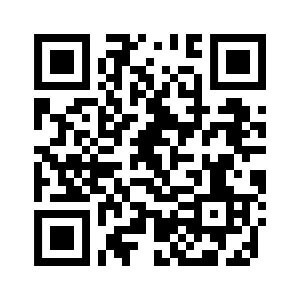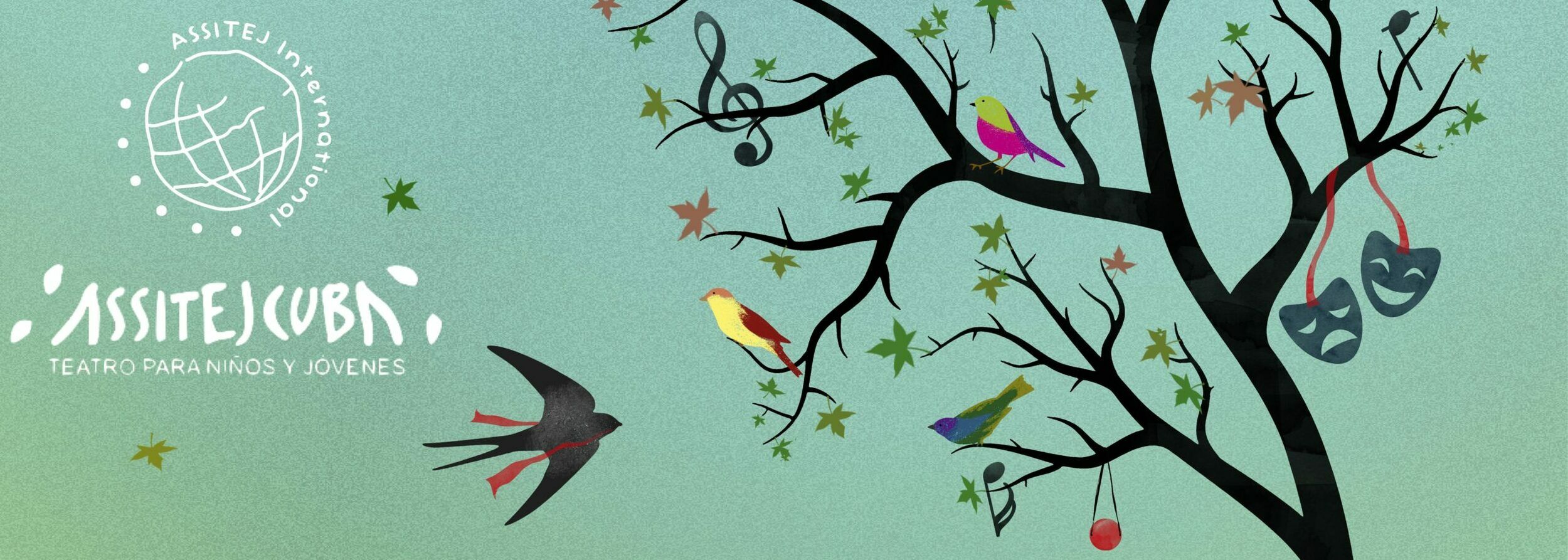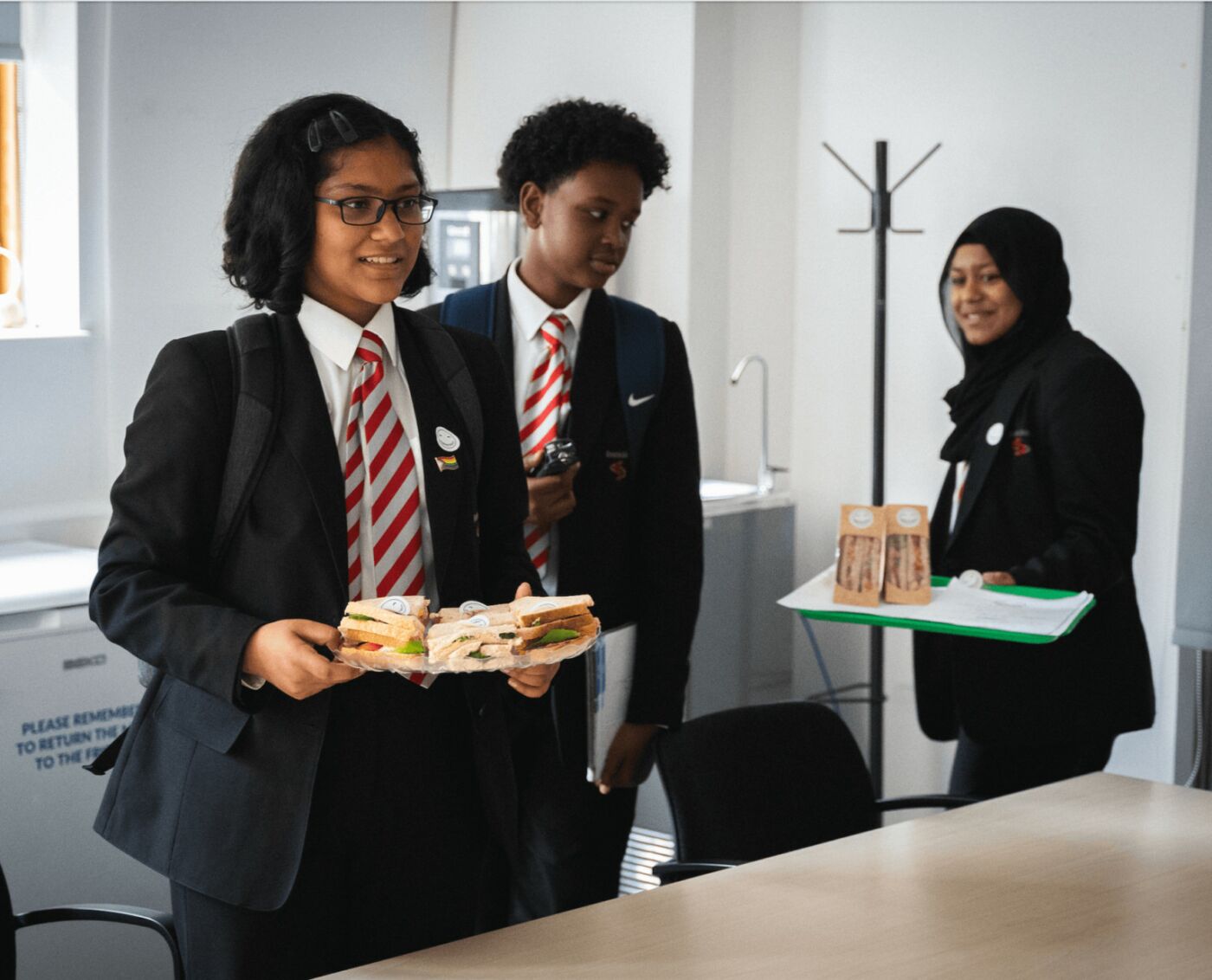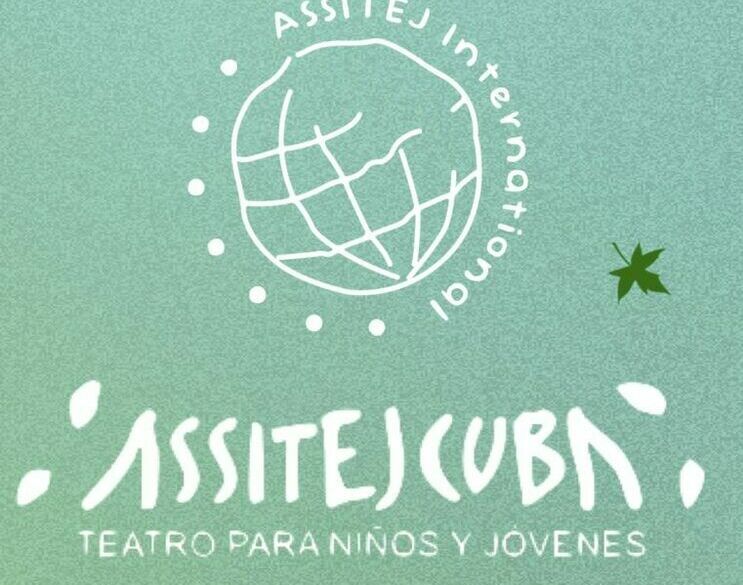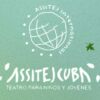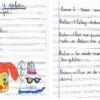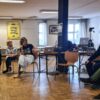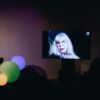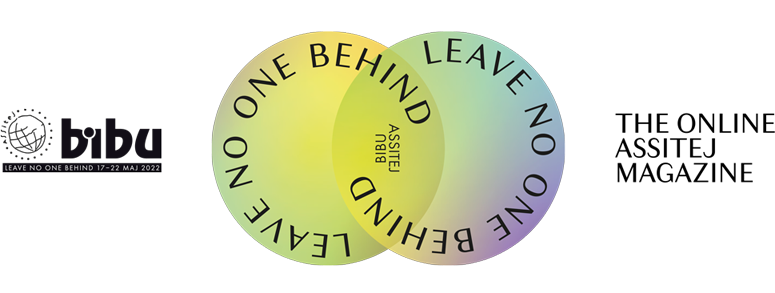Elvira (Ra) Crois
In many cultures throughout the world, contemporary arts practices continue to be perceived as a ‘tool’ to or a ‘zone of being’ in which we reflect upon the world ‘as is’ while also leaning into different worlds ‘as if’. Whereas arts in general may display an image of a sci-fi world, participatory arts practice tend to trial such different worlds in the here and now.
Examples are practices such as Coney’s playful activism (UK) or Art of Listening’s sacred activism (DK). In their participatory work, they not only perform for young audiences, but also work with groups of young changemakers to reflect upon the world that surrounds them.
For instance, the Climate Agency Box is what Coney’s youth director Toby Peach calls a ‘reserved escape room’. In this piece of playful activism, a group of children receive a mysterious box which they have to unlock and break into. The children are immersed into a semi-fictional story that addresses them as undercover agents. As agents of change, they plot a playful action – a gift with the intent of generous impact – to start a conversation with people who have a certain degree of power in their surroundings, i.e. who can make a meaningful contribution to the environment. An example of such gift is… a sandwich. During one iteration, a group of pupils left a sandwich (more specifically, the target’s favourite cream cheese and dill sandwich) on the desk of their principal, accompanied with a note that asked to make a magic phone call to the school’s supplier of food packaging to discuss composting proposals.
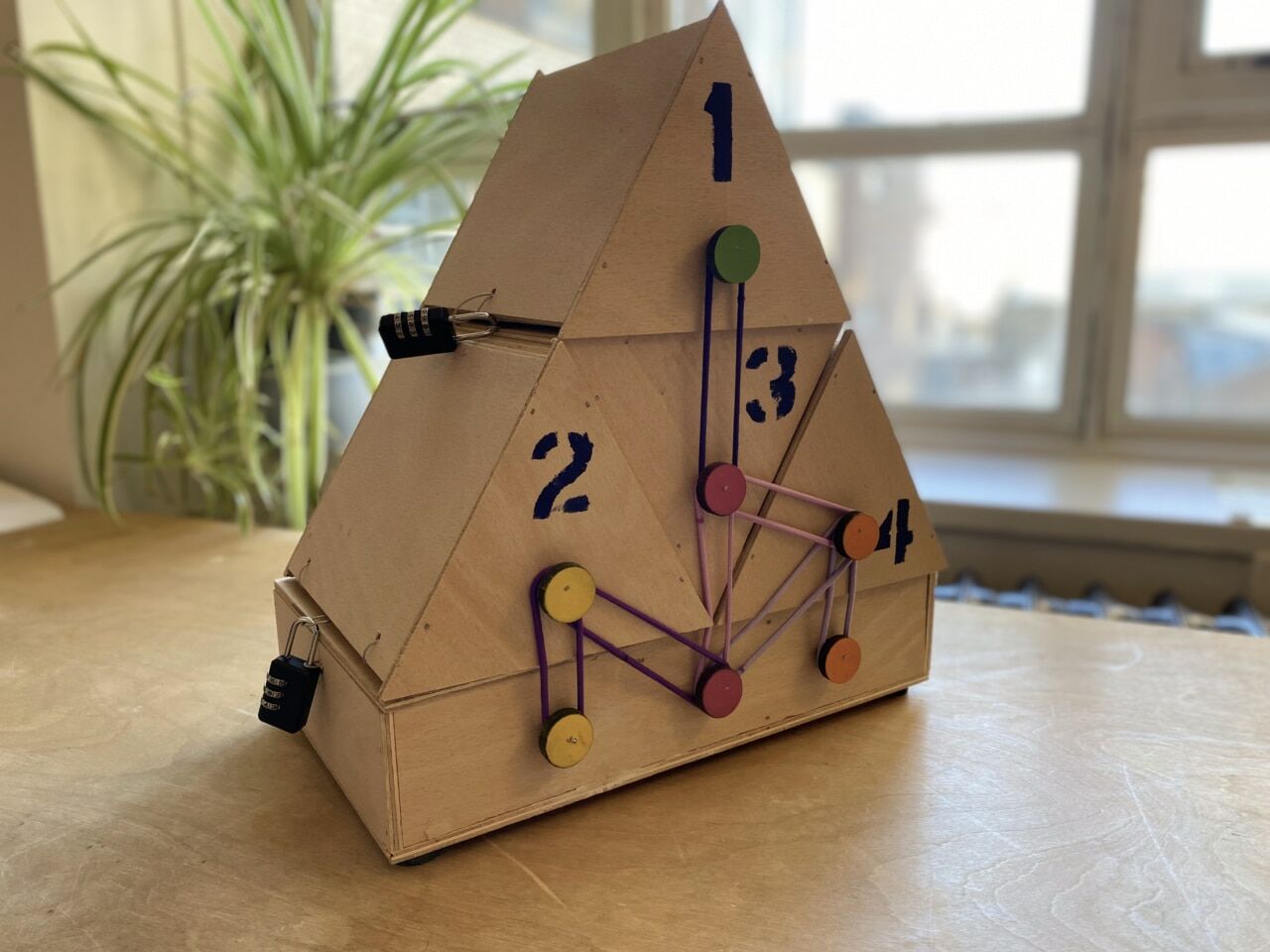
A bit different is BONFIRE, which artist Sarah John calls ‘an experiment in collective listening’. As a piece of sacred activism, BONFIRE is a host of conversational frames for youngsters, both online and on site. For instance, it is a guided audio that centres attention (our most valuable resource in the world – even more than oil!), making you aware of how you are embedded in your immediate surroundings. Or, it is a sensorial experience in which you imagine washing a loved one’s hands and draw your (chosen) family constellation. But also, it is a collective gathering where you wonder where you end and the universe begins. In BONFIRE, the conversation is the artwork – whether that conversation is with yourself, other people, or the wider cosmos around you.

Coney and Art of Listening build ‘procedural dramaturgies’ (Nibbelink 2019; Crois 2022) around play and conversation. They invite people to immerse themselves in experience, enter into relations – with questions, humans, societal challenges, objects and the many living things that surround them – and enact values. With that, they seem to embody a vision of regeneration.
The term regeneration can be placed on a spectrum with other concepts such as sustainability. Whereas sustainable refers to a situation that can be sustained, regeneration moves beyond healing towards a situation that is able to give back in a positive manner on a social and ecological level. It is not only about finding balance or recuperating. In a state of regeneration, things emerge, thrive, create.
Similarly to regeneration in a wild ecosystem (Gibbons 2021), the playful activism of Coney and sacred activism of Art of Listening wants to manifests potential and let a whole living system flourish. Their embodiment of regeneration stumbles through what French philosopher Félix Guattari (2000) calls the three ecologies, namely the mental, the social, and the environmental.
The mental ecology refers to the relations between individual and collective perceptions. The work of Coney and Art of Listening is an invitation to reflect, sense, or behave from a tentacular perspective (Duhn and Galvez 2020; Stalpaert 2021), reaching out to the wildness we are part of, i.e. a process of ‘wewilding[1]’.
The social ecology refers to the relations between individuals and social structures. It entails the speculative attempt to enact a world in which we interact with each other through curiosity, bravery, and care. It is about listening to the experiences and needs of each other, expanding our views by not letting us be guided by fear, and integrating new insights into our behaviour. Especially when working on climate with young people who grow up with fewer privilege, playful and sacred activism show the potential of social regeneration on a micro-scale.
The environmental ecology refers to the relations between living organisms and their physical environment. Young people are invited to experience relationality and become aware of how things are connected – in its major complexity of a global ecosystem but also in its simpleness of how everything affects, e.g. I change the composition of the air when I breathe, while the density of the air affects my breathing.
In different ways, Coney’s playful activism (Crois & De Backer 2022) and Art of Listening’s sacred activism, invite young people to engage with the different ecologies. Yet, all works of Coney and Art of Listening envision to embody regeneration. Not each attempt is successful in its envisioned outcome. Nonetheless, they are practices of radical hope. Practices that, in the attempt to embody the chosen values, by doing the work, reflecting upon it, and learning from it, are in constant process of regenerating themselves.
Bibliography
Crois, Elvira (2022) ‘Holding [ a Conversation with ] the Situation: The Performer’s Tactical Ability and the Aesthetic Affect of Audience Participation. An Accompanying Macrogenetic Study into Participatory Performing Arts’. PhD thesis, Antwerp and Brussels: University of Antwerp and Vrije Universiteit Brussel.
Crois, Elvira & De Backer, Free (2022). Playful Activism, Game Mechanics and Participation. Coney HQ. https://coneyhq.org/blog/playful-activism-game-mechanics-and-participation/
Duhn, Iris, and Sarita Galvez (2020) ‘Doing Curious Research to Cultivate Tentacular Becomings’. Environmental Education Research 26 (5): 731–41.
https://doi.org/10.1080/13504622.2020.1748176.
Gibbons, Leah (2020) ‘Regenerative—The New Sustainable?’. Sustainability 12(13):5483. https://doi.org/10.3390/su12135483
Guattari, Félix (2000) The Three Ecologies. London and New Brunswick: The Athlone Press.
Nibbelink, Liesbeth Groot (2019) Nomadic Theatre: Mobilizing Theory and Practice on the European Stage. Thinking Through Theatre. London: Methuen Drama.
Stalpaert, Christel (2021) ‘Tentacular Thinking-With-Things in Storied Places. Parliament of Things (2019) by Building Conversation’. In Performance and Posthumanism, 195–233. Cham: Springer International Publishing. https://doi.org/10.1007/978-3-030-74745-9_11.
Biography
Elvira (Ra) Crois is a dramaturg and Assistant Professor of the Brussels Research Centre on Innovation in Learning and Diversity [BILD] at Vrije Universiteit Brussel. Their research focuses on worldmaking within and via participatory arts and playful education for social change.
Regeneratieve ecologieën in speels en (toe)gewijd activisme
Over heel de wereld, in allerlei culturen, worden hedendaagse kunstpraktijken gezien als een ‘tool’ of een ‘zijnsplek’ om te reflecteren op de wereld zoals die ‘is’ evenals om de mogelijkheid te bieden om ons te begeven in andere werelden zoals die ‘kunnen zijn’. Kunst, in brede zin, is in staat een beeld te geven van een sciencefictionwereld. Participatieve kunst, daarentegen, heeft de neiging om zulke verschillende werelden in het hier en nu te beproeven.
Een voorbeeld hiervan is het speel activisme van Coney (UK) of het (toe)gewijde activisme van Art of Listening (DK). Deze participatief praktijken creëren niet enkel voorstellingen voor een jong publiek. Ze gaan ook aan het werk met jonge ‘changemakers’ en denken samen na over de wereld om hen heen.
Ter illustratie: de Climate Agency Box, wat Coney’s jongerenregisseur Toby Peach een ‘omgekeerde espace room’ noemt. In dit speels activistisch werk krijgt een groep kinderen een mysterieuze doos die ze moeten ontgrendelen en openbreken. De kinderen worden ondergedompeld in een semi-fictief verhaal waarin ze worden aangesproken als undercoveragenten. Als agenten van verandering plannen ze een ludieke actie – een cadeau met oog op een genereuze impact – om een gesprek te initiëren met mensen in hun omgeving in een machtspositie, d.w.z. mensen die een betekenisvolle bijdrage kunnen leveren aan het milieu. Een voorbeeld van zo’n geschenk is… een belegd broodje. Bij een van de gerealiseerde acties liet een groep scholieren een belegd broodje (met name, roomkaas en dille, de favoriet van het doelwit) achter op het bureau van hun directeur, vergezeld van een briefje met het verzoek een magisch telefoontje te doen naar de leverancier van voedselverpakkingen om opties te bespreken om te composteren.
Een beetje anders is BONFIRE, dat kunstenaar Sarah John ‘een experiment in collectief luisteren’ noemt. Onder de noemer (toe)gewijd activisme biedt BONFIRE een reeks gespreksformats aan voor jongeren, zowel online als fysiek. Een voorbeeld is een audiogids die gaat over aandacht (onze meest waardevolle ‘grondstof’ ter wereld – zelfs meer dan olie!), en waarbij je je bewust wordt van hoe je ingebed bent in je directe omgeving. Een ander voorbeeld is een zintuiglijke ervaring waarbij je je inbeeldt de handen te wassen van een geliefde, gevolgd door het in kaart brengen van je (gekozen) familie. Of, het is een collectief samenzijn die zich afvraagt waar jij ophoudt en het universum begint. In BONFIRE is het gesprek het kunstwerk – of dat gesprek nu is met jezelf, met andere mensen of met de ruimere kosmos om je heen.
Coney en Art of Listening bouwen ‘procedurele dramaturgieën’ (Nibbelink 2019; Crois 2022) rond spel en gesprek. Ze nodigen mensen uit om zich onder te dompelen in ervaringen, relaties aan te gaan – met vragen, mensen, maatschappelijke uitdagingen, objecten en de vele levende wezens om hen heen – en waarden uit te dragen. Het is een oefening in het belichamen van een regeneratieve visie.
Het woord ‘regeneratie’ of ‘herleving’ kan je plaatsen op een spectrum met andere woorden zoals duurzaamheid. Waar duurzaam verwijst naar een toestand waarin een situatie kan worden in stand gehouden, gaat regeneratie nog verder dan genezing, richting een situatie die positief bijdraagt en teruggeeft op sociaal en ecologisch niveau. Het gaat niet enkel over het vinden van evenwicht of om herstel. Bij regeneratie, ontstaan dingen, floreren dingen, worden dingen gecreëerd.
Evenzeer als bij regeneratie in een wild ecosysteem (Gibbons 2021) is het doel van speels activisme van Coney en het (toe)gewijd activisme van Art of Listening de manifestatie van potentieel en het laten bloeien van een volledig levend systeem. De belichaming van regeneratie trachten ze te bekomen doorheen ‘drie ecologieën’ te struikelen, wat de Franse filosoof Félix Guattari (2000) definieert als de mentale, sociale en milieu-ecologie.
De mentale ecologie verwijst naar de relaties tussen individuele en collectieve percepties. Het werk van Coney en Art of Listening is een uitnodiging om te reflecteren, te voelen of te handelen vanuit een tentaculair perspectief (Duhn en Galvez 2020; Stalpaert 2021), waarbij we reiken naar de wildernis waarvan we deel uitmaken, oftewel een proces van ‘wewilding’.
De sociale ecologie verwijst naar de relaties tussen individuen en sociale structuren. Het omvat de speculatieve poging om een wereld te creëren waarin we met elkaar omgaan door middel van nieuwsgierigheid, moed en zorg. Het bevat luisteren naar de ervaringen en behoeften van elkaar, het verruimen van onze opvattingen door ons niet te laten leiden door angst, en het integreren van nieuwe inzichten in ons gedrag. Bij uitstek in klimaatwerk met jongeren die opgroeien met minder privileges, tonen speels en (toe)gewijd activisme het potentieel van sociale regeneratie op microschaal.
De milieu -ecologie verwijst naar de relaties tussen levende organismen en hun fysieke omgeving. Jongeren worden uitgenodigd om relationaliteit te ervaren en zich bewust te worden van hoe dingen met elkaar verbonden zijn – in de grote complexiteit van een wereldwijd ecosysteem, maar ook in de eenvoud van hoe alles elkaar steeds beïnvloedt, bijvoorbeeld: Ik verander de samenstelling van de lucht wanneer ik adem, terwijl de dichtheid van de lucht mijn ademhaling beïnvloedt.
Het speels activisme van Coney (Crois & De Backer 2022) en het (toe)gewijd activisme van Art of Listening zijn op elk op hun eigen manier een uitnodiging voor jongeren om zich betrokken te voelen in de verschillende ecologieën. Toch beogen de verschillende werken van Coney en Art of Listening een belichaming van herleving. Niet elke poging is succesvol in het beoogde opzet. Toch zijn het praktijken van radicale hoop. Praktijken die, in hun poging om de verkozen waarden te belichamen, door het werk te doen, erop te reflecteren en ervan te leren, zichzelf voortdurend herscheppen.
Bibliografie
Crois, Elvira (2022) ‘Holding [ a Conversation with ] the Situation: The Performer’s Tactical Ability and the Aesthetic Affect of Audience Participation. An Accompanying Macrogenetic Study into Participatory Performing Arts’. PhD thesis, Antwerp and Brussels: University of Antwerp and Vrije Universiteit Brussel.
Crois, Elvira & De Backer, Free (2022). Playful Activism, Game Mechanics and Participation. Coney HQ. https://coneyhq.org/blog/playful-activism-game-mechanics-and-participation/
Duhn, Iris, and Sarita Galvez (2020) ‘Doing Curious Research to Cultivate Tentacular Becomings’. Environmental Education Research 26 (5): 731–41. https://doi.org/10.1080/13504622.2020.1748176.
Gibbons, Leah (2020) ‘Regenerative—The New Sustainable?’. Sustainability 12(13):5483. https://doi.org/10.3390/su12135483
Guattari, Félix (2000) The Three Ecologies. London and New Brunswick: The Athlone Press.
Nibbelink, Liesbeth Groot (2019) Nomadic Theatre: Mobilizing Theory and Practice on the European Stage. Thinking Through Theatre. London: Methuen Drama.
Stalpaert, Christel (2021) ‘Tentacular Thinking-With-Things in Storied Places. Parliament of Things (2019) by Building Conversation’. In Performance and Posthumanism, 195–233. Cham: Springer International Publishing. https://doi.org/10.1007/978-3-030-74745-9_11.
Biografie
Elvira (Ra) Crois is dramaturg en maakt als assistent-professor deel uit van het Brussels Research Centre on Innovation in Learning and Diversity [BILD] aan de Vrije Universiteit Brussel. Diens onderzoek richt zich op ‘worldmaking’ in en via participatieve kunst en speelse educatie voor sociale verandering.
[1] Wewilding, defined as ‘In the acknowledgment that we must care together, trying to find nature inside ourselves’, is a neologism of the e.co.lect lexicon, which is a co-creative climate vocabulary currently under development, curated by Belgian arts education organisation De Veerman. The word was created in September 2022 during the Erasmus+ project ‘Worldmaking: Crafting Spaces with and for Young People’.
